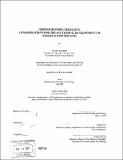| dc.contributor.advisor | Tunny Lee. | en_US |
| dc.contributor.author | Chan, Janelle (Janelle Jie-Ying) | en_US |
| dc.contributor.other | Massachusetts Institute of Technology. Dept. of Urban Studies and Planning. | en_US |
| dc.date.accessioned | 2008-01-10T16:02:35Z | |
| dc.date.available | 2008-01-10T16:02:35Z | |
| dc.date.copyright | 2007 | en_US |
| dc.date.issued | 2007 | en_US |
| dc.identifier.uri | http://hdl.handle.net/1721.1/39927 | |
| dc.description | Thesis (M.C.P.)--Massachusetts Institute of Technology, Dept. of Urban Studies and Planning, 2007. | en_US |
| dc.description | Includes bibliographical references (p. 81-82). | en_US |
| dc.description.abstract | In recent years, the Chinese government transformed their national system of housing provision and introduced market mechanisms. The consequent boom in residential real estate development and the emergence of speculative practices dramatically increased housing prices in cities. Low- and moderate-income households are being priced out of homeownership. The lack of affordable urban housing is increasingly framed as an issue of equity that is linked inherently to China's political identity as a communist nation. As such, the central government is experimenting with policy to address the issue of affordability in a commercialized housing market. The controversial "70 percent, 90 square meters rule" is one such policy that has started discussions on the development of mixed income housing. Given the current policy trend, private developers can reasonably foresee requirements to incorporate affordable housing in future developments. The primary purpose of this thesis is to highlight the growing segregation of housing based on income in China and examine the concept of mixing incomes for future urban housing developments. New luxury developments in urban centers are clustering high-income households together while spatially separating them from low- and middle-income households. | en_US |
| dc.description.abstract | (cont.) This thesis does not address how to supply more affordable housing, but rather examines an alternative that incorporates affordable housing within otherwise market-rate developments. The initial chapters provide a synopsis of the current urban housing situation in China as well as the historical housing policies in which it emerged from. Thereafter, three mixed-income housing developments in Boston, Massachusetts, USA were studied: Rollins Square, Harbor Point, and the Metropolitan. For each case, factors explored include project background, income mixture, marketing strategy, financial structure, design and layout, and property management/operations. The spectrum and resolution of income mixing were examined in detail. Research conducted includes interviews with developers, property managers, and other project participants as well as site visits, and reviews of project documentation. Case studies also include an analysis of critical success factors for each. The thesis concludes with observations and implications believed to be important to developers and policy makers contemplating or presently engaged in developing housing in cities across China. | en_US |
| dc.description.statementofresponsibility | by Janelle Chan. | en_US |
| dc.format.extent | 84 p. | en_US |
| dc.language.iso | eng | en_US |
| dc.publisher | Massachusetts Institute of Technology | en_US |
| dc.rights | M.I.T. theses are protected by copyright. They may be viewed from this source for any purpose, but reproduction or distribution in any format is prohibited without written permission. See provided URL for inquiries about permission. | en_US |
| dc.rights.uri | http://dspace.mit.edu/handle/1721.1/7582 | |
| dc.subject | Urban Studies and Planning. | en_US |
| dc.title | Chinese housing mixology : considerations for the successful development of mixed-income housing | en_US |
| dc.type | Thesis | en_US |
| dc.description.degree | M.C.P. | en_US |
| dc.contributor.department | Massachusetts Institute of Technology. Department of Urban Studies and Planning | |
| dc.identifier.oclc | 182756837 | en_US |
